In his final public address as Chief of the Defence Staff, Admiral Sir Tony Radakin cautioned against reducing the future of UK defence to what he called “simplistic ‘either / or’ debates.â€
Speaking at the Centre for Strategic and International Studies in Washington, he argued that most modern security challenges require a combined approach: “In most cases, the answer needs to be ‘and’. Hard and soft power. Regional and global. Atlantic and Pacific.â€
Radakin extended this warning to the defence technology sphere, rejecting the idea that new systems should automatically displace older capabilities. “It’s a false choice to think we can simply dispose with the old altogether in order to make way for the new, or that there is an easy trade-off to be had between capability and mass,†he said.
He recalled a period 15 years ago when counter-insurgency in Afghanistan dominated UK priorities, and platforms not deemed relevant to that mission were often questioned. “Why was the Navy building anti-air destroyers when all it really needed was cheap and cheerful corvettes to go after Somali pirates? And couldn’t the RAF make do with Tucanos rather than Typhoons?â€
According to Radakin, preserving high-end warfighting capabilities during that period has paid dividends.
“Thankfully we worked hard to protect enough of these kinds of platforms – and preserve the warfighting instincts required for peer competition. And it’s a good job we did, because these are precisely the ‘big sticks’ and capabilities that are in demand now to counter a resurgent Russia and to defend against the kind of long-range missiles that the Houthis are using in the Red Sea.â€
The outgoing CDS emphasised that the UK’s strategic posture benefits from having retained these assets while also adopting emerging technologies. “We do get many of the big decisions right. More than we give ourselves credit for. And we are better at strategy than we think,†he told the audience.
However, he warned that rapid shifts in the global context make flexibility essential: “We need to be wary of simplistic choices… Resilience and redundancy, and the ability to flex and adapt… are the attributes for long-term security.â€
Radakin concluded by stressing that the future force mix must not sacrifice traditional military platforms in favour of uncrewed or low-cost alternatives alone. “We are still going to need submarines and jets and armoured vehicles alongside our mass ranks of drones and uncrewed systems,†he said, framing the issue as one of balance rather than replacement.



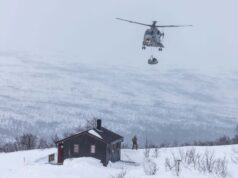

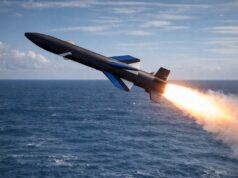
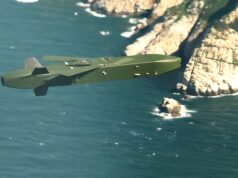



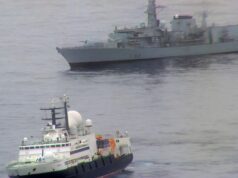

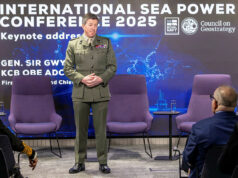

Just another talking head with a whole lot of defence cuts on his watch.
When he’s retired he’ll be lamenting cuts like Lord West and all the rest.
The only influence he has is to where the cuts might be made.
“either or” or in modern UK terms …nothing or nothing being the choice of our politcal masters for the last thirty years.
He says he remembers people saying “Why was the Royal Navy building anti-air destroyers when all it needed was cheap and chearful Corvettes” ? Well he either made that up or shouldn’t have been talking to those people.
“And couldn’t the RAF make do with Tucanos rather than Typhoons”. Really, were people actually saying that ?
I think he just made all that up as only a Halfwit would spout such rubbish !
They were not. At least no-one of any consequence was. Procurement is based on requirements. Requirements are based on plausible threat scenarios, at least half of which ( in the last couple of decades anyway), imply a peer threat necessitating high-end capabilities. Not that we haven’t been guilty of a lack of flexibility in the past. E.g. our lack of adequate defence against sea-skimming missiles in the Falklands was a consequence of the fact that the Soviets didn’t have them.
Exactly, how odd for him to make those comments.
That really wasn’t the case at all.
Army was aggressively briefing
“Couldn’t the RAF make do with Tucanos rather than Typhoons?
RAF briefed
“ Why was the Navy building anti-air destroyers when all it really needed was cheap and cheerful corvettes to go after Somali pirates?â€
How do I know – I was there when all that childish nonsense was going on.
There was a bit more nuance to all of this but he is broadly right that there was, in the era of sandy wars and parsimonious investment a push to a Mid-Lo mix rather than a Hi-Hi mix because it was MOTS and cheaper. Defence Select Committee drank gallons of that!
More recently it is well known that a lot of people pushed F18 for QEC. That would have killed Gen5 for RAF/RN.
I could go on and on with concrete examples.
Fact is hard choices were made to have QEC [best we could afford] T45 [excellent but no Mk41] T26 [class leading] Astute [amazing engineering] at the expense of mass.
Now we need mass which is T31 and its offspring with bits bolted into it.
Well if he and others were taking those questions seriously and then quoting them years later then, I’m sorry but what a rediculous bunch we have in charge.
Anyone suggesting replacing Typhoons with Tucano’s has zero credibility. anyone taking it seriously is in the wrong job.
Maybe we should have replaced SA80 with Gat Guns ?
Actually, I did hear that suggestion during some capability related meetings. Whether it was serious or simply inter-service haggling over budgets and bet projects I cannot say – but it was defo mentioned more than once.
Cheers CR
Nice name
Some are undoubtedly aware of the eponymous “Augustine’s Law” of fighter aircraft procurement, postulated in 1979 by DoD procurement official Norman Augustine, stated, in essence, that by 2054 the entire DoD annual budget would be consumed by the purchase of a single aircraft, which would have to be shared equally by USAF and USN. USMC would assume operational control each Leap Day. This mordant humor was based upon an extrapolatuon of real data. Weapon systems procurement is an equisite balancing act, deviate from that balance at a nation’s mortal peril. All should realize that on a daily basis, war is fought w/ whatever is in inventory, not in the 10-20 year acquisition dream/wish list. Personally, as sanguine re the refurbishment of BUFFs, acquisition of F-15EX, etc., as the development of the B-21, F-47, etc.
There was serious discussion about both these things. There was an investigation into converting some Tucano as CAS for Afghanistan and Iraq and ther procurement of T45 and T26 was always questioned in that period. One of the reasons (not just carriers) that only 6 T45s were procured and the T26 took so long to be ordered.
Decades ago I read that an Australia minister suggested we replace F11s with 2,000 CT-4 airtrainers as they would be cheaper to operate and, as a fleet, could carry many more bombs. At first I thought it was a joke, but I believe it was a fair dinkum quote. I just hope our current defence minister doesn’t read this otherwise our F35s and Super Hornet may well be replaced by a fleet of Grobs or something similar.
And yet the navy is heading to 11 major surface combatants and is patrolling the pacific and west Africa and the south Atlantic with ships armed with nothing more than a 30mm cannon and no 3D air search radar.. the south Atlantic has not seen a RN major surface combatant in a decade.
I would say it was not an either or choice that was made instead it ended up very much a “neither†choice.. we have neither the mass or the quality anymore. If the RN had ended up with a present force ( 2025-2030) force of 11-13 frigates and destroyers and 10-12 usable modern corvettes at 3000 tones with a medium gun, air defence missiles and a small ship fight it would be a lot more able to do its job than it is now…and if its future force was 19 large modern surface combatants at 6000-7000 tons and 11 good solid corvettes at 3000 tons it would be OK.
He did not say much about the Army, is that because its no longer much of an Army under his watch? It is sadly the weakest link, and has been for many years. New kit needed but not ordered, new kit that was ordered up to 8/10 years ago still not fully in service. Be lucky if we could scrap together one fully manned Div, it would be very short of SP Artillery that would be for sure. Many things talked about but not much ordered. Lowest man power in over 120 years.
Hardly some thing to be proud of, yet another top boss who simply thinks they did a great job when really in the case of the Army they ruined it. And its a worn out shambles. A lot of deluded people in charge who are legions in their own mind.
Radakin chooses his words carefully. He is telling the govt to protect funding for expensive, strategic programs; SSN-AUKUS, MRSS, Tempest and an Ares based IVF.
Exactly this.
Selective amnesia? We have had 25+ years in which:
– critical land equipment has not been kept up to date – Challenger, Warrior, Braveheart.
– the frigate fleet has virtually disappeared
– Astutes have been largely inactive because of maintenance constraints
-the combat air force has shrunk by half.
– solid support capability has gone
Exactly what decisions have been got right? The Ajax programme? The T45 propulsion system?
The failure to recognize what has gone wrong runs the risk that even if the budget is increased , we will make the same mistakes again.
The only way to improve mass is to avoid over specifying key new equipment and choose instead something that is good enough. Britain has no need for two very large aircraft carriers designed to match US super carrier sortie rates. Trafalgar class successor could have been a modest upgrade instead of the more complex eventual Astute design.
Choosing Ajax to replace vehicles a quarter of its weight made no sense at the time and looks no more rational now.
The only things that might be called successful are
-the complex weapons agreement with MBDA and
-the River 2 OPVs. It was widely reported that the RN didn’t want them and they were built under the TOBA agreement because of long delays in finalizing the T26 contract
If AUKUS and Tempest programmes aren’t properly specified and tightly controlled, we risk further reduction in overall combat mass.
@Peter S.
“…Britain has no need for two very large aircraft carriers designed to match US super carrier sortie rates.”
Nonsense, The size of a carrier is Not truly proportional to its cost! ‘Steel is cheap, and air is free’. It is the installed systems, that make up a good proportion of a warship’s cost.. And not forgetting the F-35b are larger aircraft, than original older type.
“Trafalgar class successor could have been a modest upgrade instead of the more complex eventual Astute design.”
The Trafalgar Class subs, were designed back in the 1970’s!
The design had limited potential to upgrade. With lots of flews! That’s why a totally new design was required!
After championing cuts to the armed forces, Admiral Radakin now faces the challenge of re-establishing himself as a serious figure — no doubt with an eye on a future boardroom or advisory post at a major defence contractor.
The professional head of the armed forces should not be resorting to throwaway anecdotes about “NAAFI girls†second-guessing procurement decisions — asking why the Navy needed anti-air destroyers rather than cheaper corvettes to chase Somali pirates, or why the RAF could not make do with Tucanos instead of Typhoons.
Of course, a Chief of the Defence Staff must answer to politicians, who ultimately act as their line managers — hardly an easy task. Yet the reality is unavoidable: under Radakin’s tenure, all three services are being left with less equipment and reduced capability.
He should be remembered as the CDS who left the Army with just 14 self-propelled howitzers.
You think we only have 14 as90’s? Are you stupid?
Spending on defence is always vital, and maintaining critical systems even when not immediately required is a wise decision based on history. Saving on waste is also important, yet there are still examples of baffling actions by the MOD. I was reviewing the Witham (military vehicle dealer) catalogue the other day, and a brand new MAN 7 tonner straight from war reserve with only delivery mileage up for disposal!! Why on earth are such assets up for sale when they could be deployed by the Army and serve a useful purpose and save the taxpayer money? The current waste by the MOD is a disgrace, with still useful kit being let go for silly money. No wonder MPs make a direct beeline for the MOD when fiscal savings are required if evidence of wastage is out there for all to see.
I think if one looked closely at what is sold off there might be a case for a proper proper investigation. I’m not saying it is, but if something looks w………
Radakin has done ok. 1950’s saw post war Britain rule the skies, Suez, prefabs and we have never had it so good. The 1960’s saw the Beatles and the Pill; the 70’s saw strikes and decimalisation and 1980’s saw Thatcher, the Falklands – swan song for the LPDs and the EU – cheap hospitality workers, BMW rescue Leyland and French water. It’s been a traumatic period of change in which we attempted to keep the economy growing by relying on immigration of ever cheaper labour, asset stripping and privatisation to foreign shareholders in the attempt to satisfy voters delusions that the country could have cheap food, a higher standard of living and first world public services and defence without paying for them. Now the chickens have come home to roost. They say in rugby the bigger they come the harder they fall. Letting go of the British empire has been painful with no shortage of colonies happy to enjoy our humiliation. India and South Africa are BRICS nations not colonies. The challenge now is analogous to that of a debilitated national patient having to digest a too large meal which contains both nutrients and poisons – assimilation with filtering. The policy of focussing on English, Scottish, Welsh and Irish manufacture of defence equipment is exactly right – it’s at the heart of restoring our core national identities – who we are and faith in our cultural values. Alex Salmond was probably right about one thing – GB could benefit by turning the constitutional clock back to 1603.
What has the Beatles got to do with the defence?
An example of how people’s spending priorities have changed.
Haven’t done a very good job in arguing against the either or attitude to defence then have you! Considering the navy is down to either that ship or that ship to leave home port, with the army and air force being no better.
I used to respect the admiral before he became 1SL, and for a goodly period of time afterwards. As CGS he’s had a good Ukraine. That’s the best I can say. His public communications have been exceedingly subpar. In this communication, I actually agree with the thrust of what he’s reportedly saying. Alas that’s not what he’s doing. The surface fleet has been shredded under his watch. It’s less either or, as much as neither nor.
Oops.. I meant CDS. Sorry, Sir!
What public comments is he allowed to make?
You people should know the rules by now.
This was his final public speech and he could have said anything he wanted that didn’t harm national security. What are they going to do, fire him, adding column inches to whatever he said? I suppose it depends if he’s angling for a peerage or not.
I agree with much of what you say but 1603 is too early and 1688 is where we should develop on from as a matter of urgency. Decide on key issues which no one does. Like what is our optimum population? If things had been allowed to take their natural course it would probably be not far North of 50-55m and I think we would be a happier, wealthier place.
Sorry. Completely different subject but with what is happening with Venezuela (US Navy) can anyone see Starmer sending any asset(s) to support the US? If for instance F16’s buzzed any US Navy ships for a 3rd time and got shot down? Leading to increased tensions.
Sorry. Completely different subject but with what is happening with Venezuela (US Navy) can anyone see Starmer sending any asset(s) to support the US? If for instance F16’s buzzed any US Navy ships for a 3rd time and got shot down? Leading to increased tensions.
Sorry. Completely different subject but with what is happening with Venezuela (US Navy) can anyone see Starmer sending any asset(s) to support the US? If for instance F16’s buzzed any US Navy ships for a 3rd time and got shot down? Leading to increased tensions.